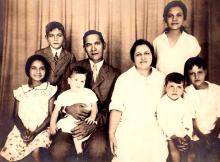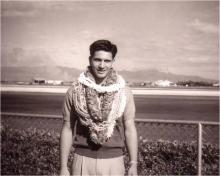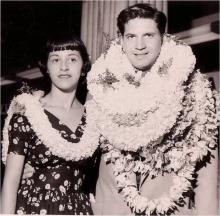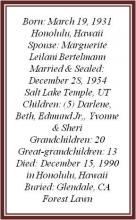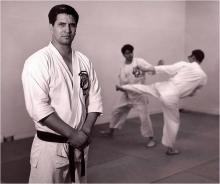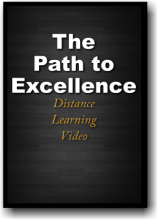Edmund Kealoha Parker was the sixth of seven children born to Arthur and Eva Parker in Honolulu, Hawaii on March 19, 1931. Being raised a member of the Church of Jesus Christ of Latter-day Saints, Ed’s parents’ exemplary belief in God and the gospel of Jesus Christ was engraved in his soul at an early age.
Growing up in a very rough neighborhood in Kalihi, his religious and moral values were a constant source of confrontation. Ed excelled in boxing and Judo in his early teenage years. At the age of 16 he was accepted as a student of Frank Chow in Kenpo Karate. Ed quickly became an addict to the arts. After learning all he could as a student, Frank recommended Ed continue his instruction under Frank’s brother, Professor William K.S. Chow – a student of James. Witnessing the Professor move for the first time was a deeply spiritual experience for Ed and it was at that moment he knew from the depths of his soul, Kenpo would be his life’s work.
Soon after graduating from Kamehameha High School, Ed was accepted to Brigham Young University (BYU) in Provo, Utah. Ed not only dedicated himself to his academic studies, but also his martial arts training. In his pursuit of mastery of Kenpo and his goal of the coveted black belt in Chow’s Art of Kenpo
|
Karate, the onset of the Korean War would delay his progress. After a 3-year stint in the United States Coast Guard, Ed’s goal of attaining his black belt was finally realized on June 5, 1953.
Upon graduating from BYU with a Bachelor’s in Sociology in June of 1956, Ed and his wife Leilani moved to California and decided to venture off to open his first Kenpo Karate Studio in Pasadena, California. Many doors were opened for Ed, as he became well known in Hollywood and trained a great many stunt men and celebrities; most notable was Elvis Presley. Kenpo began to evolve as Ed sought to create a combative martial arts system that would suit the American mind-set enabling one to execute multiple strikes to several opponents in various directions. These innovative paths lead him to become a prolific writer authoring numerous books, teaching manuals and journals.
Ed’s rapidly expanding national and global following led him to change the name of his Kenpo Karate Association to the International Karate Association in 1956. Throughout the next three decades, Ed found himself leading, directing and servicing an ever-increasing number of international groups across several continents, from Europe, South America, Australia, South Africa and the Oceanic region of New Zealand.
In 1964, Ed started the 1st Annual International Karate Championships held in Long Beach, CA. Participants from many different styles came to take part in this tournament fostering connections in the martial arts world. This historical event would be the vehicle that would launch the careers of the legendary Bruce Lee, Chuck Norris and many other prominent martial artists.
|
Line upon line, precept upon precept, Ed created his own unique symphony of motion – a masterpiece called “American Kenpo”. Through his writings and achievements, Ed became one of the most innovative and successful influences in the Martial Arts world. A pioneer who dared to believe, dared to question, dared to act rather than be acted upon. Although Edmund Kealoha Parker, Sr. passed away December 15, 1990 his legacy lives on in each lesson taught, each technique performed, each quote recited, each story re-told, and each memory shared.
|
rtmp://video.thepathtoexcellence.com/vod Think of God as the Father and Inspirer of our souls. Think of Ed Parker as the Father and Inspirer of our Art. Mr. Parker is our model for mastering the Art of Kenpo. We should follow the example of his strengths. Each of us must and will develop our own style, but the standard we aspire for should be Mr. Parker’s concept of the Art.
- Mr. Parker had so many wonderful qualities that we can model (Ponder each of these qualities.):
- Mr. Parker was a “revolutionary”; he turned the world of the Martial Arts upside-down.
- Mr. Parker had the desire and ability to make everyone feel special… and he did.
- Mr. Parker never called himself, “Master Parker.” Like anyone who truly masters an art form, he realized that was exactly what he had done. It does not mean that he had mastered all art forms let alone mastered life itself. He never considered himself above or below anyone or anything; he is simply more knowledgeable and skilled in a particular art. Like Mr. Parker, with effort we can transfer the wisdom gained from the process of mastering Kenpo to parts or all aspects of our life. God is our only “Master.”
- One piece of wisdom that Mr. Parker shared with me and that will always stick with me - “Skip! Learn to work with everyone’s strengths. If I worked with everyone’s weaknesses, I would have no students.”
- The Creed and pledges reflect his underlying simple and humble nature.
- Mr. Parker believed in God, Family, and Country - in that order. These were the sacred things to him.
- Mr. Parker truly loved his family: I never met a man who admired and respected his mother and father, and his brothers and sisters like he did. He truly considered them all to be more talented, smarter, tougher, kinder, more spiritual… Mr. Parker loved his wife. She reminded him to work with his strengths and not to be controlled by his weaknesses. His desire for his children was that each would seek to fulfill their own potentials.
- As much as Mr. Parker cared for his immediate family, he also knew that the true bonds that join us are not simply blood, but love and respect for each other. The members of Mr. Parker’s family were world-wide and not simply under his roof.
- We all need teachers. Outside of his family, Mr. Parker’s teachers were many, especially the street. He carefully watched beginning students; they were some of his greatest teachers. A personal nickname that I had for Mr. Parker was “The Great Observer.” He occasionally told stories of how his mother trained him to make detailed observations.
- Mr. Parker believed that traditions were of value, but not if they restricted the pursuit of knowledge and improvement in one’s personal Art.
- Mr. Parker modeled Jesus Christ in his use of analogies, sayings and proverbs.
- Mr. Parker used many different ways to describe an idea, because this is necessary to reach a wide variety of students.
- Mr. Parker believed in the brotherhood of all Martial Artists. His list of non-Kenpoists whom he helped is endless.
- Mr. Parker had great respect for the efforts of all legitimate Martial Artists.
- Mr. Parker stated that for every individual declared “Champion” there are at least two unknown people that are better.
- He believed that the moment of combat was the moment of truth, and the rest is just talk.
- He did not see himself as invincible.
- Mr. Parker believed that to master the Martial Arts, one must become the master of the environment.
- He was constantly in a process of renewal.
- He urged his students to relentlessly search for the truth.
- Mr. Parker continually professed TAILORING the Art to the individual and not the individual to the Art.
- He believed one of the keys to success was to learn to work within your limitations, but with effort and knowledge to expand your limitations.
- Mr. Parker was both a dreamer and a realist. He had the power to make his dreams come true. He also knew that although he had both the dreams and the power -- he had to work.
- Genius is defined as that extraordinary intellectual or intuitive capacity, especially endowed with the power of creative activity. Mozart was certainly a genius. Although as a youth he had tutors to guide him, he never “learned” music. He simply “knew” music. So it was with the life of Ed Parker, although he had tutors along the way, he inherently “knew” the concept of Kenpo, and “learned” the refinements with time and experience. Einstein, certainly a genius, once noted that any second rate mathematician can solve a problem. The “creative genius” is the one who finds the problems. Without any doubt, Ed Parker was a creative genius. He found the problems with the Martial Arts. He further instilled in his students the logic not only to solve the problems, but also to discover what problems still exist. Thus he created the “brain” of his system of thinking. It is one that can never die -- one that will perpetually grow.
- I have been fortunate to travel much of the world and to meet many incredible people. Some were geniuses, but Mr. Parker is the only individual that I met who was a kinesthetic, visual, and auditory genius.
- Mr. Parker was frugal but for the sake of generosity.
- Mr. Parker was grateful of the support he received from those around him.
- Mr. Parker was extremely forgiving. I sometimes think that he would have had no students if he did not have this great capacity.
- Mr. Parker believed that a real Black Belt always greets people with a handshake and a smile.
- Mr. Parker believed that as Martial Artists we must:
- Have logic.
- Have good basics.
- Be creative.
- Believe in ourselves.
- Be persistent.
- Be forgiving.
- Be a model for those who come after us.
- Mr. Parker believed that when a Black Belt conveys kindness instead of hate, peace instead of animosity, and uses words instead of his fists, he is truly a Black Belt.
- He believed that creativity must be confined within the boundaries of logic.
- Mr. Parker knew that the process of Mastery involves taking what is apparently difficult, and making it look easy.
- Mr. Parker was always on the cutting edge of the Art. His list of “firsts” is a topic worthy of itself.
- Mr. Parker observed and compared his own accomplishments with those who had mastered other art forms.
- He believed that a truly great artist can be measured by what he leaves the future generations of his art.
- Several years ago Mr. Parker, Frank Trejo, and I were flying to Mexico City for a seminar. I had been writing the manuals for Mr. Parker for several years, when we finally reached the time to write the 1st Degree Black Belt Manual. One section that I really wanted to put into the manual was, “What it means to be an Ed Parker’s Black Belt!” As was his custom Mr. Parker told me to go ahead and write it myself, but this time I persisted that I really wanted his thoughts first. Without hesitation he looked at me and said, “Basics!,” and after a slight pause for effect, he added, “Logic.”
Like Mr. Parker, remember:
- Make everyone feel special.
- Be tolerant. Be forgiving. Work with people’s strengths.
- Respect the efforts of others.
- Love God, family, and country.
- Be strong, but humble.
- Seek the truth.
- Be creative, but stay within the boundaries of logic.
- Develop sound basics.
- Be persistent.
- Be a model, especially for children.
|
